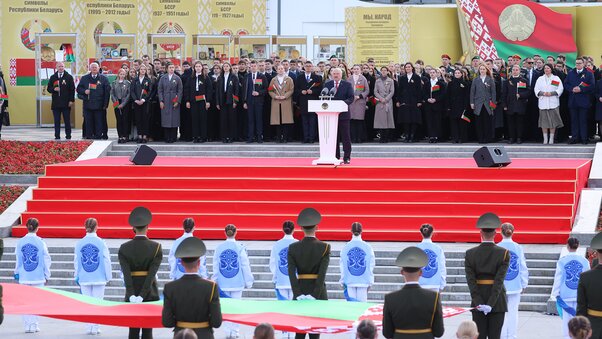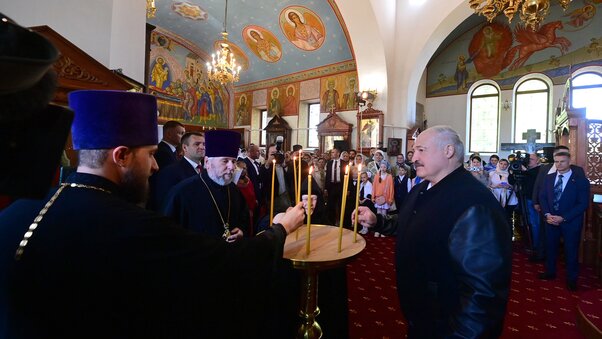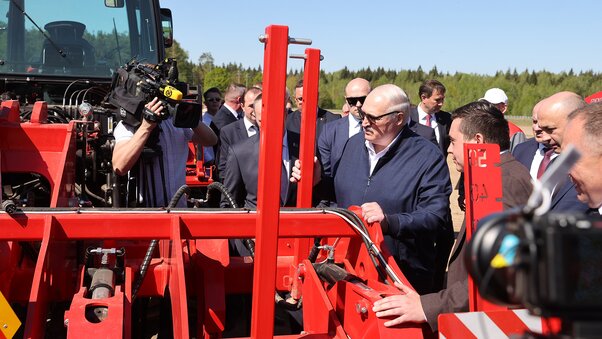Belarus Media Forum in Mogilev
- 32
- 35:03
Belarusian President Aleksandr Lukashenko took part in the Belarus Media Forum in Mogilev on 28 May.
The event took place at the Palace of Culture. It has brought together more than a thousand delegates, including journalists, bloggers, media executives, and press secretaries.
“You and I live in a very challenging, but interesting time. This is particularly true for those who literally chronicle the history of our country and their own life,” said Aleksandr Lukashenko.
The head of state noted that the forum will focus on journalists’ impact on the transformation of society. This topic has always been relevant.
“It is great that you are analyzing your impact and critically assess your role. We talk about this impact of journalists and others all the time. The time we are living in has pushed journalists to the forefront and made the media community a powerful factor in political discourse. I often meet with media workers in all kinds of formats, I see many of them almost every day, which is part of our work. I know that you feel the zeitgeist of the era of information confrontation, or the so-called war of meanings, like no one else. You are living and breathing it. In this reality, you are fighters, defenders, strategists, and tacticians, and information is a resource, a commodity, and a weapon,” Aleksandr Lukashenko emphasized.
Yet, when the country is in the crosshairs of aggressive propaganda, journalists should not be the only fighters, the president noted. Therefore, the media forum also gathered managers and employees of national and regional media outlets, bloggers and communications experts, representatives of universities and ideology workers, press secretaries of central government bodies and organizations, as well as representatives of government agencies in charge of information policy.
“In a word, these are people who shape the information policy and defend the information sovereignty of the state in line with their official responsibilities,” added the head of state.
"The day before, while I was preparing for a meeting with you, I tried to remember when the concepts of ‘information war’, ‘mental war’, ‘fake news’, ‘post-truth’, and others came into our lives. Actually quite recently. Literally some 6 to 7 years ago. How old are the phenomena that they name? We will not be able to count. Probably they are as old as the humanity. Because an information war is a prelude to a hot phase of confrontation," Aleksandr Lukashenko said.
According to him, the information war implies disinformation, attempts to mislead the enemy, to create a fog of useless information, to confuse, to make you doubt your values, beliefs, and strengths. "The plot is as old as the world," the president stated.
"What is fake, post-truth, deepfake which are much talked about today? This is a common lie. Distortion of facts. Forgery. We all need to call a spade a spade. We need to talk about complex things in a simple and clear way. After 2020, we talked a lot about responsible journalism. We agreed to tell the truth even if it sounds boring. We were aware that it would be difficult to compete with destructive sources," Aleksandr Lukashenko said.
This work should be based on the truth. As an example, the president cited the situation with the migrant crisis at the border. "The bitterest truth is better than the sweetest lie. It needs to be exposed and shown. Therefore, the truth and only the truth. This is the most important thing," the head of state stressed.
"But look what is happening. The self-exiled opposition openly say that they have no levers of pressure on the country, except for sanctions. Indeed, life has taught Belarusians to think critically and verify information before drawing conclusions, or to disregard it if it is impossible to verify. This is a small victory. Your victory. Victory for those who had to sift through the dirt poured on us then. Our journalists worked well in conjunction with law enforcement agencies. The programs you created went down in history as a manual for protecting the country's information sovereignty," Aleksandr Lukashenko said.


